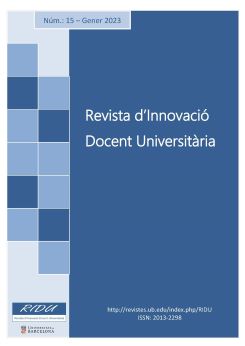The interview through role-playing as a strategy for developing oral communication skills
Article Sidebar

Main Article Content
This paper presents an experience of educational innovation carried out in the subjects Diagnosis and Evaluation of Special Education Needs, and Diagnosis and Evaluation of Hearing and Language Disorders, both belonging to the fourth year of the Degree in Primary Education at the University of León. The training action described consists of the development of interviews as a strategy to develop oral expression, using processes of peer assessment and self-assessment of learning. For the implementation of the activity, a five-phase process has been followed: design of the activity and the evaluation instrument, execution of the activity, analysis of the results, evaluation of the training action and redefinition of the activity. Although the different phases are detailed in this document, emphasis has been placed on the evaluation of the activity, whose data has been collected through the formulation of open questions to the students of the 2021/2022 academic year. MAXQDA 2022 software was used for the analysis of the answers, accounting for a total of 73 codes around aspects such as the usefulness and opinion on the role-playing technique, the suitability of the peer assessment, the adequacy of the rubric or the overall assessment of the activity. The results showed that the students positively value this type of activity, since it brings them closer to the reality that they will find in the classrooms of any educational center in a simulated way. However, the improvement proposals of the students have been considered to make adjustments, both in the development of the activity and in its rubric. It is concluded that role-playing through interviews is an ideal technique, not only for the development of oral expression, but also for other skills that, as specialist teachers, they will put into practice in their professional future.
Article Details

This work is licensed under a Creative Commons Attribution 4.0 International License.
(c) Diego González-Rodríguez, Héctor González-Mayorga, 2023
Copyright
Authors whishing to publish in this journal agree to the following conditions:
- The author or author retain copyright and grants the journal the right of first publication of the paper.
- The texts will be published under license "Reconocimiento Creative Commons 4.0 España", which allows to share, distribute, reproduce and the public communication of the paper, as long as the name of the author or authors and the journal are clearly stated.
Diego González-Rodríguez, Universidad de León
Doctor en Psicología Educativa y Ciencias de la Educación y Profesor Ayudante Doctor del área de Métodos de Investigación y Diagnóstico en Educación de la Universidad de León. Su investigación se centra en el abandono escolar temprano, el rendimiento académico durante la transición de la Educación Primaria a la Educación Secundaria Obligatoria y en las competencias del docente. Ha participado en varios congresos nacionales e internacionales y publicando artículos científicos vinculados a esta temática. Es miembro del grupo de investigación de Evaluación, Orientación y Políticas Educativas (EVORI) de la Universidad de León. Uno de los puntos fuertes del grupo EVORI se encuentra en sus líneas de investigación, al abarcar desde la Educación Infantil hasta la Educación Superior, lo que le ha permitido, como investigador, participar en diversos proyectos de ámbito nacional e internacional. Ha colaborado con la Agencia para la Calidad del Sistema Universitario de Castilla y León (ACSUCYL), en la evaluación de programas de grado, máster y doctorado.
Héctor González-Mayorga, Universidad de León
Doctor en Psicología Educativa y Ciencias de la Educación por la Universidad de León. Profesor asociado en el área de Métodos de Investigación y Diagnóstico en Educación (MIDE) de la Universidad de León y funcionario de carrera del Cuerpo de Maestros en la especialidad de Educación Primaria. Sus líneas de investigación se centran en el impacto de las evaluaciones internacionales y en la formación inicial y permanente del profesorado.